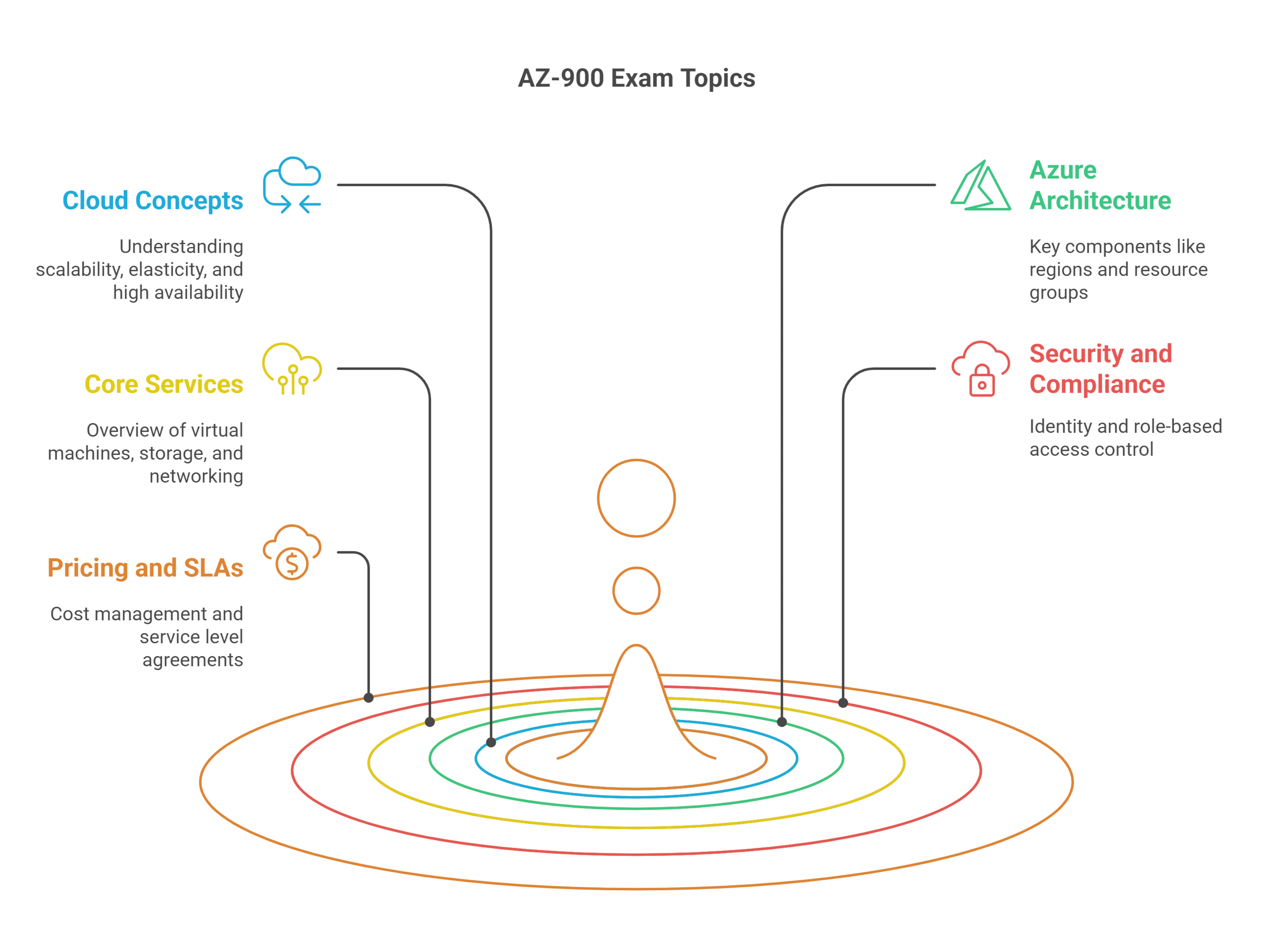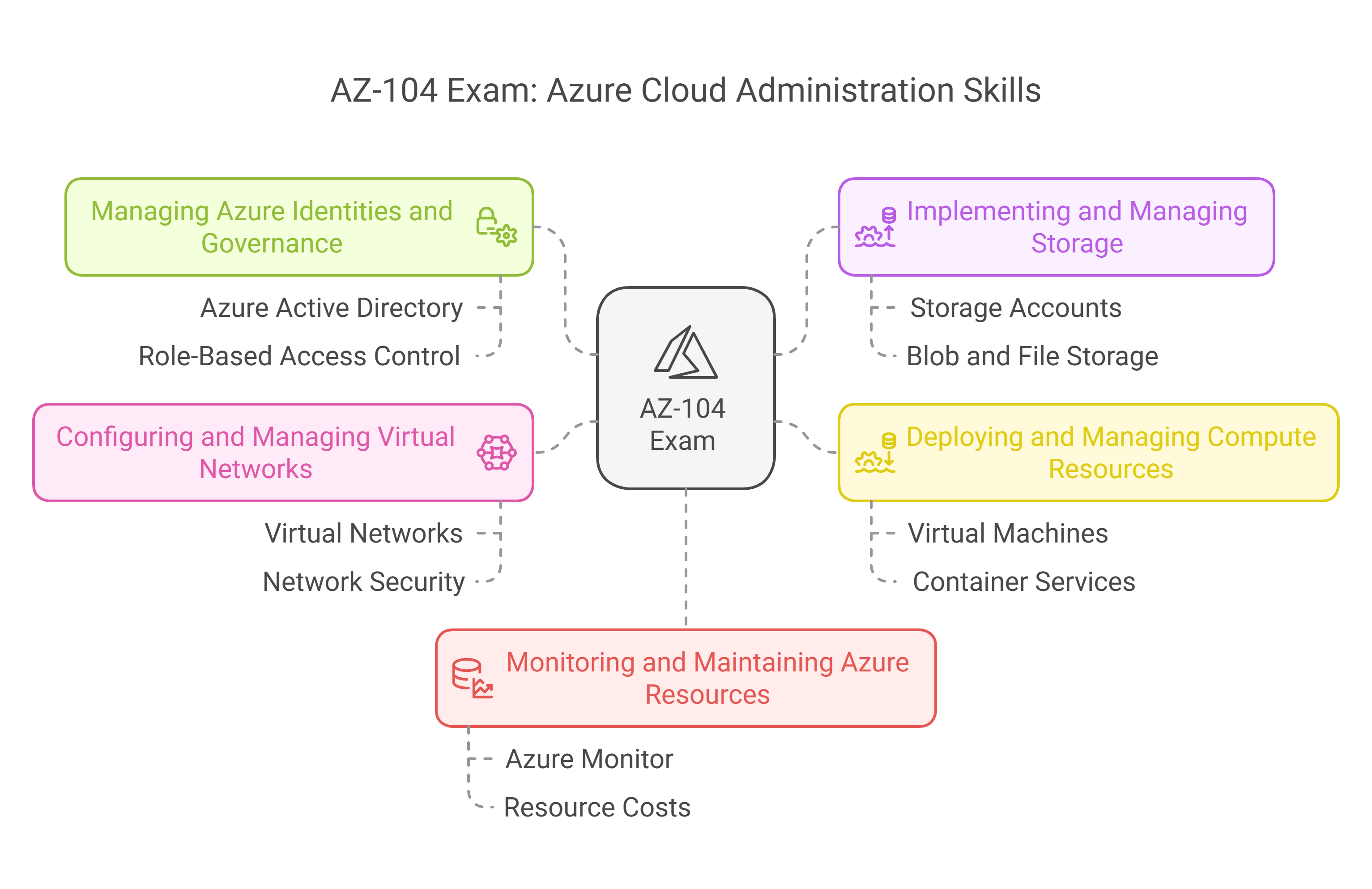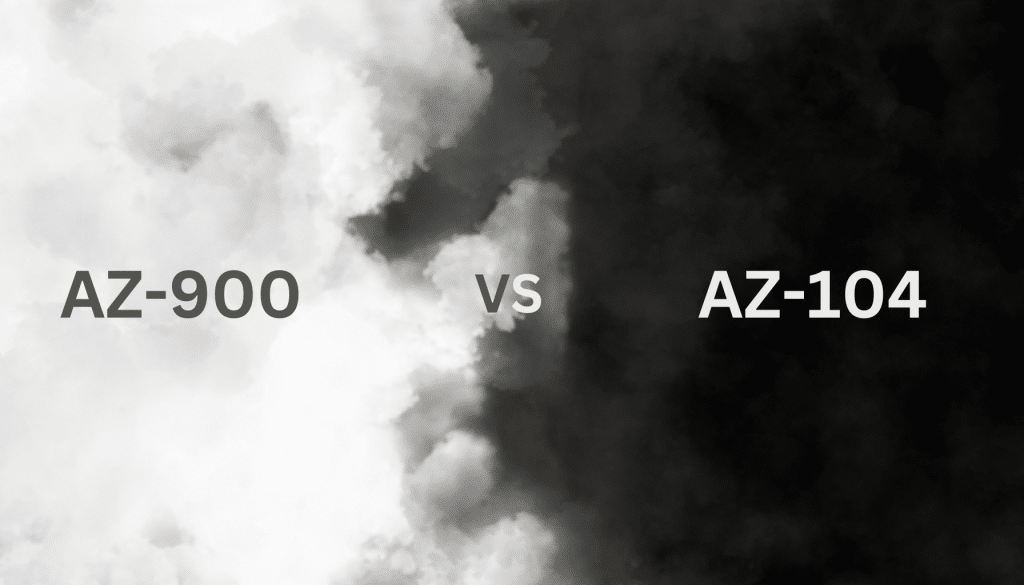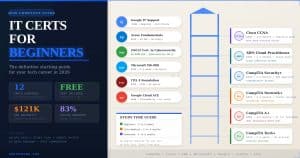Choosing between AZ-900 and AZ-104 can feel a bit confusing, especially if you’re just stepping into the world of cloud computing or looking to level up your skills. Both certifications focus on Microsoft Azure, but they serve different purposes and skill levels. Whether you’re a beginner trying to understand the basics of cloud services or an IT professional aiming for more hands-on roles, picking the right certification can make a big difference in your career path.
In this guide, we’ll break down the key differences, career opportunities, difficulty levels, and what you need to know before making your choice. Let’s dive in and find out which one suits you best!
Comparison!
| Feature | AZ-900 (Microsoft Azure Fundamentals) | AZ-104 (Microsoft Azure Administrator) |
| Purpose | Introduction to Azure and cloud concepts. Suitable for beginners. | Focuses on managing Azure resources and services. Suitable for administrators. |
| Target Audience | Non-technical professionals, beginners, and those exploring cloud computing. | IT professionals with hands-on experience in Azure administration. |
| Exam Difficulty | Basic level, focusing on general cloud concepts. | Intermediate level, requiring technical knowledge and hands-on expertise. |
| Prerequisites | None. Open to anyone interested in learning Azure. | Experience with Azure services, including virtual machines, networking, and storage. |
| Exam Content | Cloud concepts, Azure pricing, and core Azure services. | Azure resource management, security, identity, networking, and monitoring. |
| Certification Type | Fundamental-level certification. | Associate-level certification. |
| Ideal for | Understanding basic cloud concepts and gaining foundational knowledge. | Building and managing Azure solutions as an administrator. |
AZ-900: What’s It All About?
Azure Fundamentals, or AZ-900, is often the first step for those looking to understand cloud computing with Microsoft Azure. It’s a foundational cert that gives a broad overview of Azure services, pricing, and security. Unlike more technical exams, AZ-900 keeps things high-level, focusing on the “what” and “why” rather than the “how.”
What’s Inside the AZ-900 Exam?
The exam touches on a variety of core areas of data science, all aimed at building a solid understanding of cloud basics. It covers:
- Cloud concepts – Understanding the basics like scalability, elasticity, and high availability.
- Azure architecture – A breakdown of key components like regions, availability zones, and resource groups.
- Core services – An overview of commonly used Azure services like virtual machines, storage, and networking.
- Security and compliance – Basics of identity, role-based access control (RBAC), and key compliance standards.
- Pricing and SLAs – Understanding cost management, pricing calculators, and service level agreements.
Most of the questions revolve around these concepts, testing how well you grasp Azure’s structure, offerings, and management tools.

Who Should Consider Taking AZ-900?
AZ-900 is ideal for those who are stepping into cloud computing for the first time. If you work in IT but haven’t touched cloud services yet, this cert is a great way to get familiar with Azure’s capabilities. It’s also useful for non-technical roles like sales, marketing, or management teams who need to understand cloud jargon when dealing with clients or making business decisions.
Even if you’re planning to dive into more advanced certs later, AZ-900 helps build a solid base.
You might want to consider AZ-900 if you:
- Are new to cloud technologies and want a simple introduction.
- Work in a role where understanding cloud services helps with decision-making.
- Need to add an Azure cert to your resume but don’t want something too technical.
- Want to build confidence before moving on to deeper technical certs.
What’s the Best Way to Prepare?
Studying for AZ-900 isn’t too demanding, but a little planning can make things easier. The good news? Microsoft offers plenty of free and low-cost resources to get started.
- Microsoft Learn – This free platform covers everything in the exam with interactive modules, quizzes, and hands-on labs.
- Practice tests – Taking mock exams helps you understand the type of questions and manage your time better.
- Video courses – Platforms like Udemy and Pluralsight offer affordable video lessons with expert guidance.
- Documentation and blogs – Microsoft’s official docs and community blogs often break down complex topics in a way that’s easy to understand.
- Hands-on practice – Even though the exam is more theoretical, playing around with the Azure free tier helps cement concepts better.
Most people can prep for AZ-900 in a few weeks, depending on how much time they can dedicate each day.
What to Expect in the Exam?
The AZ-900 exam isn’t designed to trick you, but it does test how well you understand the basics. Expect around 40-60 multiple-choice and scenario-based questions. Some questions might ask you to match Azure services to their functions, while others could present real-world business scenarios where you need to choose the right solution. To get a feel for actual exam patterns and boost confidence, try AZ-900 Exam Dumps from Cert Empire
- Format: Multiple-choice, true/false, and drag-and-drop questions.
- Duration: Around 60 minutes.
- Passing score: 700 out of 1000.
- Cost: Varies by region, but usually around $99 USD.
Is It Worth It?
If you’re aiming for a career in cloud computing, AZ-900 is a great way to get your foot in the door. It’s not going to land you a technical job by itself, but it does show employers that you understand cloud basics and are willing to learn.
For those already working in IT, it’s a chance to validate their cloud knowledge without diving deep into advanced concepts. Plus, having an Azure cert on your resume can make you stand out, even if you’re in non-technical roles.
Even if you’re planning to dive into more advanced certs later, AZ-900 helps build a solid base. For a detailed overview of topics, exam objectives, and study strategies, check out our AZ-900 certification guide.
AZ-104: What’s It All About?
The Azure Administrator Associate, or AZ-104, is the next step for those who want to go beyond cloud basics and start working with Azure hands-on. This cert is aimed at IT professionals who manage cloud services, covering day-to-day operations like virtual machines, storage, networking, and security. Unlike the introductory AZ-900, AZ-104 dives into the “how” of managing Azure’s core services, making it ideal for those looking to take on administrative roles.
What’s Inside the AZ-104 Exam?
The AZ-104 exam focuses on the practical aspects of cloud administration, ensuring you have the skills to manage Azure environments effectively. It covers:
- Managing Azure identities and governance – Working with Azure Active Directory (AD), implementing role-based access control (RBAC), and managing subscriptions and resource groups.
- Implementing and managing storage – Setting up storage accounts, working with blob and file storage, configuring backup and recovery options.
- Deploying and managing compute resources – Managing virtual machines (VMs), autoscaling, container services, and serverless solutions like Azure Functions.
- Configuring and managing virtual networks – Setting up VNets, subnets, and IP addressing, along with VPNs, load balancing, and network security.
- Monitoring and maintaining Azure resources – Using Azure Monitor to track performance, configuring alerts, and managing resource costs efficiently.
Expect the questions to focus on applying these skills in practical scenarios, ensuring you know how to configure and troubleshoot Azure environments.
For step-by-step preparation methods and proven approaches to boost your chances of passing, follow our AZ-900 exam tips and strategies.

Who Should Consider Taking AZ-104?
AZ-104 is perfect for IT professionals who already have some experience with Azure or general cloud technologies. If you’re managing infrastructure on-premises and want to transition to cloud-based services, this cert can help bridge the gap. To understand its key topics, exam format, and the best strategies for passing, read our AZ-104 Certification Guide It’s also ideal for those in support or operations roles who need to understand how to keep Azure resources running smoothly.
This cert is a good fit if you:
- Have experience managing IT infrastructure and want to move to the cloud.
- Are already working with Azure and want to validate your skills with an official cert.
- Want to step into cloud administration roles like cloud engineer or support specialist.
- Need to improve your understanding of Azure’s core services for better career opportunities.
What’s the Best Way to Prepare?
Studying for AZ-104 requires a mix of theory and hands-on practice. The exam focuses heavily on real-world tasks, so getting comfortable with the Azure portal and command-line tools is crucial. Some of the best ways to prepare include:
- Microsoft Learn – Offers free, self-paced courses covering all exam objectives with interactive labs and quizzes.
- Hands-on practice – Set up an Azure free-tier account to work with storage, networking, and compute resources directly.
- Practice tests – Taking mock exams from platforms like MeasureUp or Udemy helps identify weak areas and get used to the exam format. Many professionals also use Cert Empire for high-quality, up-to-date practice tests that closely resemble real exam questions, making preparation more effective
- Video courses – Platforms like Pluralsight and A Cloud Guru offer step-by-step guides with practical demonstrations.
- Official documentation – Microsoft’s detailed docs provide deep dives into each Azure service covered in the exam.
Since AZ-104 covers more technical ground than AZ-900, most candidates spend several weeks or even months preparing, depending on their experience level.
What to Expect in the Exam?
The AZ-104 exam is more challenging than AZ-900, focusing on practical tasks and troubleshooting scenarios. You can expect 40-60 questions covering various aspects of Azure administration. If you want to test your readiness with real exam-style questions, check out the AZ-104 Exam Dumps from Cert Empire. Some will require you to select the best solution for specific business needs, while others may test your knowledge of Azure command-line tools and portal configurations.
- Format: Multiple-choice, drag-and-drop, and case study-based questions.
- Duration: 120 minutes.
- Passing score: 700 out of 1000.
- Cost: Around $165 USD (varies by region).
Some questions may involve lab-based scenarios where you’ll need to perform tasks in a simulated Azure environment.
Is It Worth It?
If you’re planning to work with Azure in a hands-on role, AZ-104 is a valuable cert that can help boost your career. It demonstrates to employers that you have the skills needed to manage cloud resources efficiently. While it may not be a beginner-level cert, it’s a great stepping stone to more advanced Azure roles like Cloud Engineer or Solutions Architect.
For those already working in IT, AZ-104 provides a way to transition into cloud roles with confidence. Adding it to your resume can improve your chances of landing Azure-related job roles and increasing your earning potential.
Learning Curve for AZ-900 vs AZ-104
The learning curve for AZ-900 is smooth, even for those with little to no technical background. It’s all about understanding the fundamentals, basic cloud concepts, Azure services, pricing, and compliance. The exam is more theoretical, focusing on definitions and scenarios without diving deep into technical configurations. Most people find the content easy to grasp, especially with Microsoft’s free learning resources.
AZ-104, however, has a steeper learning curve. It requires hands-on experience with Azure and familiarity with IT concepts like networking, data storage,, and identity management. The exam tests your ability to deploy, configure, and troubleshoot Azure services, which means you need to understand not just what the services do, but how to work with them in real-world scenarios. If you’re new to cloud administration, AZ-104 can feel overwhelming at first, especially when dealing with complex topics like virtual networks, role-based access, and automation.
To put it simply:
- AZ-900: Easier to understand, mostly concepts, suitable for beginners.
- AZ-104: More challenging, requires hands-on experience, suitable for those with IT knowledge.
Ideal Study Timelines Based on Experience Levels
How long you should study depends largely on your background and familiarity with cloud technologies.
- For AZ-900:
- Beginners with no IT experience: 3-4 weeks of part-time study (a few hours per week).
- IT professionals with some cloud knowledge: 1-2 weeks should be enough to review and pass.
Since the exam focuses on fundamental concepts, most candidates can get by with a few hours of daily study using Microsoft Learn, practice tests, and basic hands-on exploration in the Azure portal.
- For AZ-104:
- Beginners transitioning from on-prem IT roles: 2-3 months of consistent study, including hands-on practice.
- Experienced IT professionals with Azure exposure: 4-6 weeks of focused preparation to fine-tune skills.
AZ-104 requires a deeper understanding and hands-on practice, which takes time. You’ll need to experiment with Azure services, learn command-line tools like PowerShell and Azure CLI, and explore practical use cases to feel confident about the exam.
Common Challenges Faced During Preparation
Both certs come with their own set of challenges, but the nature of difficulties varies significantly.
For AZ-900:
- Staying focused on theoretical content without hands-on experience can make it harder to retain information.
- Some topics, like pricing models and compliance, can feel a bit dry and confusing for those without business exposure.
- The wide range of Azure services covered might feel overwhelming for complete beginners.
For AZ-104:
- Managing the technical depth required can be a struggle, especially for those new to cloud administration.
- Hands-on practice is essential, and not everyone has access to resources or enough time to experiment with Azure services.
- Understanding the complexities of networking and security settings in Azure can be challenging for those used to traditional on-prem environments.
- Balancing study with work commitments, especially when tackling complex topics like monitoring, automation, and virtual networks.
Comparing the Investment: Cost Breakdown
Before diving into an Azure certification, it’s important to consider the financial side of things. Both AZ-900 and AZ-104 come with their own costs, not just in terms of the exam fee but also the additional expenses that might come up while preparing. Let’s break down the costs and see how they stack up against the potential career benefits.
Registration Fees and Additional Expenses
The registration fee for each exam varies depending on your location, but here’s a general idea:
- AZ-900 (Azure Fundamentals): Around $99 USD, making it one of the most affordable cloud certs.
- AZ-104 (Azure Administrator Associate): Costs approximately $165 USD, a bit pricier but justified by the technical depth it covers.
Value for Money in Terms of Career Returns
When comparing the cost to potential career benefits, both AZ-900 and AZ-104 offer good value, but the returns differ based on the roles they lead to.
- AZ-900:
- While it’s a great entry point, it’s more of a stepping stone rather than a direct job qualifier. It helps you build foundational knowledge and might be useful for roles in sales, marketing, or business decision-making.
- The return on investment is moderate; it won’t immediately boost your salary but can enhance your resume for cloud-related positions.
- Ideal for individuals looking to get their foot in the door without spending too much upfront.
- AZ-104:
- This cert offers a much better return, as it qualifies you for roles like Azure Administrator, Cloud Engineer, and IT Support Specialist, with salaries averaging $80,000 to $120,000 USD depending on experience.
- Since cloud skills are in high demand, investing in AZ-104 can lead to higher-paying opportunities and long-term career growth.
- Employers often value hands-on skills, so the practical experience gained while preparing also adds value beyond just the certification itself.
Simply put, AZ-900 is great for foundational knowledge, but AZ-104 provides a direct pathway to higher-paying cloud roles, making it a better investment in the long run.
Which Certification Opens More Doors?
Choosing between AZ-900 and AZ-104 depends on where you are in your cloud journey and what career goals you have in mind. While both certs focus on Microsoft Azure, the career opportunities they unlock are quite different. AZ-900 serves as a stepping stone, offering foundational knowledge, while AZ-104 is a more technical cert that can lead directly to job roles in cloud administration and operations.
Career Paths That Align with Each Certification
AZ-900:
This cert is all about understanding the basics of cloud computing and Azure services. It’s great for those who are new to cloud technologies and looking to add Azure knowledge to their skillset. However, it’s not meant for highly technical roles. Instead, AZ-900 aligns with positions such as:
- Cloud Sales Specialist: Helps businesses understand Azure’s potential and recommend solutions.
- Project Manager (IT-related projects): Provides cloud awareness to support decision-making.
- Marketing Professionals: Useful for those working in cloud-based product promotions and strategies.
- Business Analysts: Helps in understanding cloud service costs and performance metrics.
- Entry-level IT Support: Useful for support teams needing a basic understanding of cloud-based systems.
If you’re just starting in IT or working in a non-technical role that deals with cloud services, AZ-900 gives you the foundation you need. It won’t directly qualify you for technical positions, but it does provide an edge when applying for roles that require cloud literacy.
AZ-104:
This cert is for those who want to work hands-on with Azure and take up technical roles. It’s aimed at IT professionals who manage cloud infrastructure and services. AZ-104 cert holders can apply for positions like:
- Azure Administrator: Handles the day-to-day management of Azure services such as VMs, storage, and networking.
- Cloud Engineer: Works on deploying, managing, and optimizing cloud infrastructure.
- Systems Administrator (Cloud-based): Responsible for managing cloud and hybrid environments.
- Infrastructure Engineer: Focuses on designing and managing cloud-based systems.
- Technical Support Engineer (Cloud Operations): Provides troubleshooting and support for cloud-based systems.
If your goal is to land a cloud-focused job with responsibilities like configuring virtual networks, managing security, and optimizing cloud workloads, AZ-104 is the right path to follow.
Salary Prospects: How Do They Stack Up?
Since AZ-900 is an entry-level cert, salaries for holders tend to be on the lower end compared to AZ-104. However, it can still provide an edge for job seekers, especially those looking to break into cloud-related roles.
AZ-900 Salary Estimates:
- Entry-level roles: $50,000 – $75,000 USD per year
- Non-technical roles (Sales, Marketing, Business Analysts): $60,000 – $85,000 USD per year
- Junior IT support roles: $55,000 – $80,000 USD per year
AZ-900 holders often work in positions where cloud knowledge is helpful but not the primary focus. It can be a useful addition to resumes, especially for professionals in business or support roles who want to understand cloud concepts without diving too deep into technical configurations.
AZ-104 Salary Estimates:
AZ-104, being a more technical cert, opens doors to better-paying cloud jobs where hands-on skills are required. It aligns with roles that demand daily cloud management and operational expertise.
- Cloud Administrators: $80,000 – $110,000 USD per year
- Azure Engineers: $90,000 – $130,000 USD per year
- IT Systems Administrators (Cloud Focus): $75,000 – $100,000 USD per year
- Infrastructure Engineers: $85,000 – $115,000 USD per year
In most cases, the salary gap between AZ-900 and AZ-104 holders can be quite significant. AZ-104 validates deeper technical knowledge, making it a more attractive option for companies looking to hire cloud professionals for administrative and support roles.
Industries That Value Each Certification the Most
The demand for Microsoft Azure certifications spans across various industries, but the type of fundamentals certifications employers look for depends on the sector and the level of cloud adoption within their business operations.
Industries that Value AZ-900:
- Retail and E-commerce: Businesses looking to migrate to cloud-based platforms and require team members such as an Azure developer associate who understand cloud concepts at a basic level.
- Finance and Banking: Professionals in compliance, operations, and finance can benefit from understanding Azure cost models and compliance standards.
- Sales and Consulting Firms: Sales teams that promote cloud solutions can benefit from an AZ-900 cert to understand what they are selling.
- Marketing Agencies: Professionals managing cloud-based tools like CRM systems can benefit from knowing Azure fundamentals.
- Small to Medium Enterprises (SMEs): Companies planning to adopt cloud technologies but still at an early stage in their cloud journey.
AZ-900 is mostly valued in roles that don’t require heavy cloud administration but still benefit from cloud knowledge for strategic decision-making.
Industries that Value AZ-104:
- Technology and Software Development: Cloud administrators and engineers play a crucial role in maintaining infrastructure for development teams.
- Healthcare: Ensuring secure and compliant cloud-based storage for patient data.
- Government and Public Sector: Managing cloud deployments while adhering to strict security and compliance standards.
- Manufacturing and Logistics: Optimizing operations through cloud-based services like IoT and real-time analytics.
- Large Enterprises: Companies with existing Azure deployments that require skilled administrators to manage resources efficiently.
AZ-104 is highly sought after in industries with heavy cloud infrastructure reliance, as businesses need professionals who can handle configurations, security, and performance optimization.
How Salary Expectations Change with Experience
Experience plays a huge role in salary growth, and the impact of Azure certs becomes more evident as professionals gain hands-on exposure in real-world cloud environments.
AZ-900 Growth with Experience:
- 0-2 Years Experience: $50,000 – $65,000 USD (Basic understanding, entry-level jobs)
- 3-5 Years Experience: $70,000 – $85,000 USD (Moving into cloud-adjacent roles like project management or consulting)
- 5+ Years Experience: $80,000+ USD (AZ-900 combined with additional certs like AZ-104 or specialized cloud skills)
Since AZ-900 is a foundational cert, salary growth depends largely on additional skills acquired over time. Many professionals choose to stack AZ-900 with more advanced Azure certs to boost their earning potential.
AZ-104 Growth with Experience:
- 0-2 Years Experience: $75,000 – $90,000 USD (Junior administrator roles, basic deployments)
- 3-5 Years Experience: $95,000 – $120,000 USD (Cloud engineer roles, increased responsibility)
- 5+ Years Experience: $120,000+ USD (Senior cloud administrator, team lead, or specialization in security/automation)
With AZ-104, salaries increase significantly as professionals take on more responsibility, gain deeper technical skills, and possibly move into specialized areas like security, networking, or automation.
Job Roles You Can Target with Each Certification
The roles you can pursue with AZ-900 and AZ-104 vary based on the depth of knowledge each cert provides. AZ-900 introduces the basics of cloud computing, making it suitable for entry-level and non-technical roles, while AZ-104 focuses on the hands-on management of Azure services, opening doors to technical and specialized positions.
Positions Suited for AZ-900 Holders
AZ-900 is an entry-level cert, so it’s best suited for roles that require a general understanding of the cloud platform and services rather than deep technical expertise. It’s ideal for individuals who need to work around cloud technology rather than directly with it. Some potential roles include:
- Cloud Sales Associate – Helps customers understand Azure’s capabilities, assisting in selling cloud solutions by explaining their benefits and use cases.
- Business Analyst (Cloud Focus) – Works with stakeholders to assess cloud adoption, cost management, and operational impact based on Azure services.
- Technical Recruiter (Cloud Hiring) – Assesses and hires cloud professionals by understanding Azure fundamentals and industry needs.
- IT Support Associate (Basic Cloud Knowledge) – Provides basic support to end users by assisting with Azure-related queries, such as access and permissions.
- Marketing Specialist (Cloud Products) – Works in product marketing, promoting Azure-based services and communicating cloud benefits to clients.
- Project Coordinator (Cloud Projects) – Supports cloud migration and implementation projects by coordinating between technical and non-technical teams.
While AZ-900 alone won’t qualify you for deeply technical roles, it serves as a stepping stone for those looking to move into cloud-related jobs in the future. It’s a good fit for those wanting to get familiar with Azure before committing to a more technical certification.
Advanced Roles Available with AZ-104
AZ-104 is designed for those who want to work directly with Azure services in a technical capacity. It validates hands-on skills in managing Azure resources, making it a valuable asset for professionals looking to advance in cloud administration. Some key roles AZ-104 can help you land include:
- Azure Administrator – Manages cloud resources, including virtual machines, storage solutions, and network configurations, ensuring the cloud environment runs smoothly.
- Cloud Engineer – Focuses on deploying and optimizing cloud environments, ensuring performance, security, and cost-effectiveness.
- Systems Administrator (Azure Focus) – Handles cloud-based infrastructure, assisting with automation, deployments, and scaling of cloud resources.
- Infrastructure Engineer (Cloud Solutions) – Designs and maintains cloud infrastructure, ensuring reliability and availability for business applications.
- Technical Support Engineer (Azure Operations) – Provides troubleshooting and support for Azure-based deployments, resolving performance and security issues.
- Cloud Security Administrator – Focuses on securing Azure resources by implementing role-based access control (RBAC), network security, and monitoring tools.
Since AZ-104 covers practical administration tasks, it opens doors to roles with higher responsibility, including managing workloads, the data processing optimizing performance, and ensuring security compliance in Azure environments.
Do You Need Any Prior Knowledge Before Taking the Exam?
Before diving into AZ-900 or AZ-104, it’s helpful to understand what level of experience and knowledge you need to succeed. While both exams cater to different skill levels, knowing what to expect can help you determine if you’re ready to take on the challenge or if you should spend more time preparing.
Prerequisites for AZ-900 and AZ-104
AZ-900 (Azure Fundamentals):
One of the biggest advantages of AZ-900 is that there are no formal prerequisites. It’s designed for beginners and those who are new to cloud computing. You don’t need to have any technical background to take this exam, making it an ideal starting point for individuals exploring cloud concepts for the first time.
However, having some familiarity with basic IT concepts can make studying easier. If you’ve worked with computers, software applications, or networking at a basic level, you’ll likely find it easier to grasp the core topics.
AZ-900 is perfect for:
- Beginners with zero cloud experience.
- Professionals in non-technical roles (e.g., sales, marketing, business management).
- Students looking to build foundational cloud knowledge.
- IT professionals wanting an introduction to cloud technology before moving to technical certifications.
AZ-104 (Azure Administrator Associate):
Unlike AZ-900, AZ-104 assumes a certain level of IT knowledge. While there are no strict prerequisites, Microsoft recommends at least six months of hands-on experience administering Azure environments. Candidates should be familiar with core Azure services and basic IT operations such as networking, virtualization, and security concepts.
It’s important to have a good understanding of:
- Azure workloads like virtual machines (VMs), storage, and networking.
- Managing and monitoring cloud services.
- Familiarity with tools like Azure CLI, PowerShell, and the Azure portal.
- Security fundamentals such as identity management and access controls.
AZ-104 is best suited for:
- IT professionals with experience in managing on-prem infrastructure who are transitioning to the cloud.
- Cloud support specialists looking to advance to administrative roles.
- System administrators who want to validate their Azure management skills.
- Candidates who have completed AZ-900 and want to take their cloud knowledge to the next level.
If you don’t have hands-on experience yet, it’s highly recommended to spend time experimenting with Azure services using a free-tier account before attempting the exam.
Keeping Your Certification Valid: Renewal Considerations
Earning an Azure certification is a great achievement, but it doesn’t end there. Microsoft regularly updates its cloud services, which means certifications need to be renewed to stay relevant. Both AZ-900 and AZ-104 require periodic renewal to ensure that certified professionals remain up to date with the latest changes in Azure technologies.
How Long Each Certification Stays Valid
Currently, both AZ-900 (Azure Fundamentals) and AZ-104 (Azure Administrator Associate) are valid for one year from the date you pass the exam. This means you’ll need to renew your certification annually to keep it active.
Microsoft used to offer certifications that were valid for two years or more, but given the fast-changing nature of cloud computing, they’ve shortened the validity period to one year to ensure that certified individuals remain knowledgeable about Azure’s latest features and updates.
- AZ-900 and AZ-104 certifications expire one year from the passing date.
- Renewal must be completed before the expiration date to maintain certification status.
- Failing to renew means you’ll have to retake the full exam to regain certification.
Final Thoughts
Whether you’re starting with AZ-900 to build a solid foundation or advancing your career with AZ-104, keeping your certs valid ensures you stay on top of evolving cloud technologies and remain valuable to employers. Staying updated and continuously improving your cloud skills can open doors to better job opportunities and career growth.
FAQs
Is AZ-900 enough to start a cloud career?
AZ-900 is a good starting point but not enough for technical cloud roles. It provides foundational knowledge, but hands-on certs like AZ-104 are needed for career advancement.
Can I skip AZ-900 and go straight for AZ-104?
Yes, if you have basic IT knowledge, you can jump straight to AZ-104. AZ-900 is not a mandatory prerequisite, but it helps if you’re new to machine learning and cloud computing.
How difficult is AZ-104 compared to AZ-900?
AZ-104 is significantly more challenging as it requires hands-on skills and deeper technical understanding, whereas AZ-900 is mostly theoretical and beginner-friendly.
Do employers prefer AZ-104 over AZ-900?
Yes, employers value AZ-104 more because it proves hands-on Azure management skills, while AZ-900 is seen as an introductory cert with limited technical depth.
What’s the best way to prepare for these exams?
Use Microsoft Learn, take practice tests, and get hands-on experience with Azure services to strengthen your understanding and practical skills.
Which certification is better for non-technical professionals?
AZ-900 is the better choice for non-technical roles like sales, marketing, or business management, as it covers cloud concepts without deep technical details.
How often do the exams get updated with new content?
Microsoft updates certification exams periodically, typically every 6-12 months, to reflect the latest Azure services and industry trends.
Do these certifications help with career growth in the long term?
Yes, they provide a strong foundation and open doors to cloud-related roles, with opportunities to advance into specialized and higher-paying positions.


























